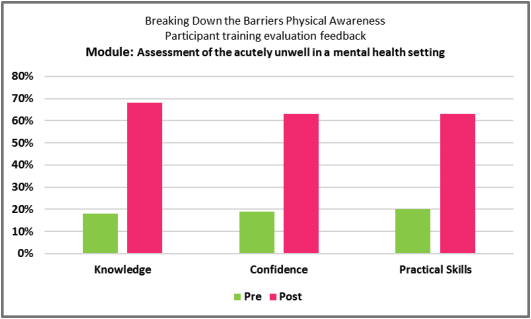Health Education England funded: Breaking Down the Barriers
Improving confidence and developing staff capabilities across NHS mental health settings
Current Situation
The Five Year Forward View for Mental Health, 2016 highlighted that people with mental health problems have poorer physical health than the general population, often they are unable to access the physical healthcare they need and experience unnecessary health inequalities. People with a serious mental illness (SMI) accessing mental health services on an in/outpatient basis and settings do not always have their physical health needs identified, assessed, monitored, managed appropriately or receive timely information and support they need, to adopt a healthier lifestyle. Figures obtained from NHS England in 2016 found more than 8,000 serious incidents were reported by mental health trusts in England the previous year. There has been a steady increase in the numbers of incidents recorded by 58 mental health trusts in England from 6,074 to 8,139 from 2012-2015.
Some of the real challenges mental health trusts experience are competing training course priorities, poor uptake of training, unable to release staff to attend and/or deliver training sessions, trying to fit in training into an already packed programme. UCLPartners commissioned by Health Education England, north, central and east London (NCEL) conducted a needs assessment in 2014 across mental health settings through structured interviews focus groups, questionnaires and surveys to understand the training needs and requirements of staff in a mental health setting.
Key findings from the needs assessment report in relation to current existing and future training needs showed;
- Over 50% of the doctors across mental health settings surveyed had received less than 2 hours training on managing physical health conditions in the past year
- 95% of mental health nurses saw physical health related responsibilities as part of their duty, and a majority were currently providing some form of physical health care, despite not having had much training in this area;
- Nearly 56% of the mental health nurses surveyed were not aware of any training courses on physical health run locally at the trust;
- 57% of those who had accessed education in physical health during their pre-registration did not feel that it had prepared them to look after the physical health of their patients.
Mental health and mental health and multidisciplinary staff who undertook the needs assessment, highlighted an urgent need for a physical health awareness training every 6 months; preferably of a minimum half day, targeted, face to face training sessions twice a year. The challenge was to provide appropriate and relevant physical health awareness training, resources and delivery modes for mental health staff that met their day to day operational, clinical needs and management of patients with complex care.
What have we done so far?
With the main emphasis on upskilling mental health professionals, UCLPartners facilitated the development of Breaking Down the Barriers (BDtB), the co-creation and delivery of six free, adaptable physical awareness training modules for use across mental health settings and higher education institutes. BDtB physical health training aims to increase overall awareness, improve early identification, assessment management, timely sign-posting and referrals of patients with complex mental and physical health needs. BDtB physical awareness training has been created for delivery in bite sizes, classroom Training is through a mixture of presentations, practical exercises, videos tutorials, case studies, scenarios, quizzes including discussions.
Positive practice: Increasing knowledge and developing capability

Dr Sergio Sawh, Emergency Medicine Specialist, Registrar & ED simulation fellow at University College Hospital London, has delivered the highest number of training sessions to clinical and non-clinical staffacross mental health trusts within the NCEL geographical region. Following the success of the training, there has also been a high demand for training from other localities, most recently from South Kensington & Chelsea mental health centre. BDtB training simulation scenarios include the management of the collapsed patient, over-sedation and the practical use of Situation, Background, Assessment and Recommendation (SBAR) communication tool.
Seeing results: what attendees have said following physical awareness training by Dr Sergio Sawh:
“This type of training needs to happen regularly and everyone who is patient-facing should have this training.”
“Training was very eye-opening and made me realise just how much more there is to learn if I am to become confident in managing a patient who has collapsed in my care and at my trust. However, I now feel that I am capable.”
“I enjoyed the scenarios and practical involvement, it has highlighted areas in my practice area where we require essential equipment to deal with medical emergencies.”
“Overall, it’s been a great learning experience as we sometimes get rusty as psychiatrists.”
The diagram below shows pre-and post measurements on knowledge, confidence and practical skill levels of mental health and multidisciplinary staff who attended training.
 Mental health professionals and multidisciplinary staff are in unique positions to help and empower people with an SMI to improve their physical health. BDtB physical health awareness resources aim to support staff by building on existing skills and knowledge to help reduce risk factors known to adversely affect the physical health of people with an SMI.
Mental health professionals and multidisciplinary staff are in unique positions to help and empower people with an SMI to improve their physical health. BDtB physical health awareness resources aim to support staff by building on existing skills and knowledge to help reduce risk factors known to adversely affect the physical health of people with an SMI.
Ronke Adejolu, Programme Manager, UCLPartners said “Breaking Down the Barriers is proving reciprocal and collaborative training approach can help build and develop capabilities of staff, hereby reducing serious incidences across mental health trusts. “
To access BDtB downloadable training resources please visit; http://www.e-lfh.org.uk/programmes/breaking-downthe-barriers/. For more information, contact Ellen Nelson Ellen.Nelson@uclpartners.com

